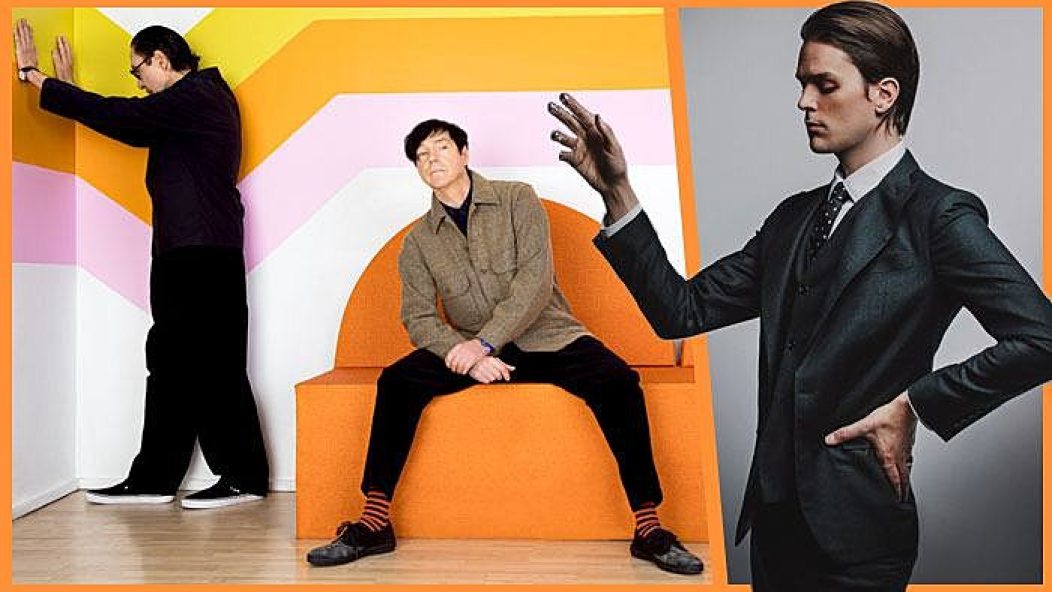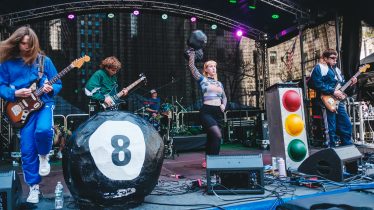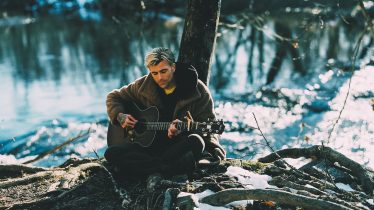
iDKHOW's Dallon Weekes feels it's his duty to tell you about Sparks
While touring with Waterparks a few years ago, Dallon Weekes of I DONT KNOW HOW BUT THEY FOUND ME found himself in the Alternative Press office. During his time hanging out, making videos and chatting about the bands he loves, he revealed his fascination with Sparks. Weekes had only discovered the band formed by Ron and Russell Mael five or six years ago via the time machine of YouTube. The Maels have been raising their tent in the world’s rock circus for 40-plus years, with a catalog of 24 albums to their name. They’ve also taken more left turns in their music than a high-speed bumper-scooter. Given iDKHOW’s idiosyncratic tracks and Sparks’ sphere of influence, we knew these two rock generations needed a summit meeting.
Sparks had their 24th album, A Steady Drip, Drip, Drip, released this spring. iDKHOW’s full-length debut, Razzmatazz, is slated for release Oct. 23. With the pandemic creating a moratorium on touring, the timing aligned to get Weekes and the Maels on a conference call.
Read more: Dallon Weekes says the new iDKHOW LP is “all over the place”
Weekes dialed in from his home in Utah, while the Maels checked in from their respective Southern California homes. And thus another installment of Alternative Press’ Idol Worship came to fruition. Weekes was more fascinated than fanboy, celebrating the Maels’ creativity and longevity in no uncertain terms. The Maels waxed philosophically about their creative impulses, imita…uh, colleagues, and their impending documentary from acclaimed British director Edgar Wright. The Maels wouldn’t tell us which celebrities ended up testifying in the movie. But they wished they would’ve met Weekes much earlier to get him in front of Wright’s cameras.
DALLON WEEKES: I don’t know any other band that have released as many albums as Sparks have. Consistently releasing music like this is really, really impressive. I find it a challenge myself to find blocks of time every single day to sit down and work. But is that what you normally do? Create a 9-to-5 schedule for this sort of stuff? What’s it like?
RON MAEL: There are two ways of writing for us. I have a little setup at my place, really incredibly primitive—embarrassingly primitive. So some of the songs are written in that way. And then over the past five or six albums, we’ve also written things where we just start with no preconceptions at Russell’s place and try to come up with something. Maybe just a background and then later have some other vocal thing added to it. Because it’s really important for me now after all this time to not just write in the same way. I need lots of different kinds of ways of working. You don’t want to say “discipline” because it makes it sound like you’re just a bank or something. But we really do work consistently. It always seems like to us like the albums are always coming out really far apart. But I guess when you have enough of them, it gives the appearance of there being a concentration. But we don’t work 18-hour days.
DALLON WEEKES: It seems like just yesterday you were debuting Hippopotamus, and now there’s A Steady Drip, Drip, Drip. I’m a big fan. Sparks have been in the ether and orbiting all of the other bands that I listen to. It’s only maybe five or six years ago that I started to actively seek out this band Sparks that everybody’s always referencing. And I fell in love immediately. It’s been really interesting discovering a band with 30-plus years’ worth of career. One of the questions I had about your musical journey is how you’ve been so consistently innovative. When it comes to someone saying to you, “Oh, you should hear this new band” and it sounds like something you did in 1976 or ’79 or whatever. Do you turn it off and go, “Well, we did that. Not really interested”?
RUSSELL MAEL: We like to not be living in such a bubble that we aren’t aware of everything that’s going on. We always like to hear new stuff. We always hope that we’ll find something that cuts through and makes you wish you had done that because it’s pretty cool. But a lot of times that isn’t the case. You appreciate it if you hear something that maybe sounds like it was influenced by you or whatever. There are 24 albums now. Each time you set out to do a new album, it gets daunting to come up with something that you think is fresh and not rehashing what you’ve done. You’re always trying to think, “Well, what can that be?” Bearing in mind certain givens: There are my vocals, and there’s Ron’s lyrical slant and all that. But what kind of context can you put them in? I’m not answering your question at all. [Laughter.]
DALLON WEEKES: Talking about your vocals and your songwriting in particular, there are definitely signature Sparks things that put a very specific thumbprint into a sound. And then on the next album, you take a left turn away from that. You have consistently done that throughout your careers. It’s interesting to see exactly how many bands have taken a page out of the Sparks handbook. The biggest example would probably be Queen or maybe the Pet Shop Boys in the ’80s. The stuff you were doing in the late ’70s was clearly paving the way for bands like that. It’s only become apparent to someone like me after I’ve stumbled across your 30-, 40-plus years of catalog. Is that something you are frustrated by or at least… Well, I’m sure you’re aware of it. How could you not be?
RON: The interesting thing to us is just how varied stylistically the people that have borrowed from us [are]. It’s just one style that people have borrowed, but it’s all over the map. A long time ago, we would hear other people that seemed like they were taking a bit of what we had done but missing the essence, really. But now, we really don’t feel that way. We’ve been able to continue where a lot of those bands aren’t continuing to work.
And we feel a real obligation in a certain sense to further our legacy and not let down the people that have followed us through time. You were mentioning being not ancient history as far as following us. But people that have just discovered us are appreciating what we’re doing. We’re trying to be surprising all the time.
DALLON WEEKES: Are there people, whether it’s fans or press or whatever, that tend to romanticize certain periods of your career that you would rather forget? Whether it was a difficult time in your career or the people you were working with at the time? Or do people expect you to never let go of a certain era and not evolve beyond a certain sound?
RUSSELL: I think we’ve been lucky more recently that, like Ronald had mentioned, history is being rewritten about the band and that more new and younger people are being acquainted with the band. So they don’t have the period when something like Kimono My House came out. They don’t know about the cultural situation surrounding it and what it meant at that time in the U.K. especially. I think that’s actually a positive thing. There is this thing where Kimono My House is the gold standard or something. But we don’t feel that way. And I don’t think a lot of the newer fans feel that way, either. They see that album as just one album of many. We love the people that have been there from the beginning that know Kimono My House from the time it and “This Town Ain’t Big Enough For Both Of Us” came out. It was something unique and special. I think, over time, the whole thing shifts. And we’re really happy when people come to the band just knowing the latest album. If the first album you ever heard of Sparks is A Steady Drip, Drip, Drip, we’re really happy about that.
DALLON WEEKES: I’ve been reading about the documentary about your career that Edgar Wright is doing. I can’t wait to see it. I can’t think of a more appropriate director to do a documentary on Sparks.
RUSSELL: Yeah, we can’t, either. Edgar’s aim with this film was that he really wanted to do anything within his power to present a portrait of the band in a way that was really fresh and in the spirit of what Sparks are. And hopefully get the word out to an audience that might not necessarily be fans of Sparks at the moment. He wanted to share his passion for the band. It’s two years of work that he’s been doing on this. That takes a lot of motivation and dedication to focus for two years doing a film about a band that he felt was such a part of his life. We’ll be really happy to have you and everybody else see this because, in a non-dry way, it paints a picture of the whole story.
RON: I’ve read other people’s approaches to do documentaries. We’ve never accepted any, partly because we didn’t have the faith in the directors that we have with Edgar. Plus, [we have an] appreciation of what he’s done in the past, but also his slant on the band. He really has a passion for Sparks. But he didn’t want to dwell on the past, and he didn’t want to downplay it. But he really felt that what we were doing now was as strong as it was at any period in our past. He shot festivals that we played in Tokyo and Mexico City and then some shows in London and Los Angeles. It isn’t like, “Here’s some old footage and the essence of the band.” It was over the entire period and that was the one thing that really sold us.
DALLON WEEKES: I think it would be a shame to approach it that way, to focus on any one particular era of the band that’s been able to span, what, 40-plus years?
RUSSELL: Yeah. But hey, who’s counting? [Laughs.]
DALLON WEEKES: Exactly, exactly! Have you seen the documentary yet? I remember seeing on social media, over the course of the past two years, you and him both putting the word out [and] asking for footage, whether it be interviews or performances. Is there anything in the context of the documentary that maybe you’d rather forget about?
RUSSELL: Without being too specific, he wanted to have a rounded picture of the band for better and [for] worse on certain things and not make it a total puff piece. But at the same time, his enthusiasm and love for the band comes through loud and clear. I think he did a really fair picture of the ups and downs of everything. But in the end, showing that part of it was the perseverance factor. And being able to continue to do music that’s as provocative and creative as it was in any other period. Too bad we didn’t have contact with you then. You could have been in the documentary.
DALLON WEEKES: I imagine that it’s overwhelming to have someone outside of the Sparks hemisphere take that much time and care, poring over everything that you’ve done over the course of your lives. Then collecting it and trying to cram it in two hours seems like a monumental task. I can’t imagine trying to undertake something like that because just trying to go through your entire catalog is a monumental task. Finding the spaces and moments to do something unexpected is what’s really impressed me by your catalog of music.
RON: Thank you. I’ve got no other response to that other than to blush.
DALLON WEEKES: Well, I’m fighting off the blushing myself. Because you know what? Being able to discover Sparks and wander through that body of art that you’ve made has inspired me more than any of the other bands that I’ve loved for 20-plus years. As someone who is a newer fan, I feel like I have this weird responsibility to share what Sparks have done with people who listen to my band and what we do.
RON: Thank you. You have our permission. [Laughs.]








